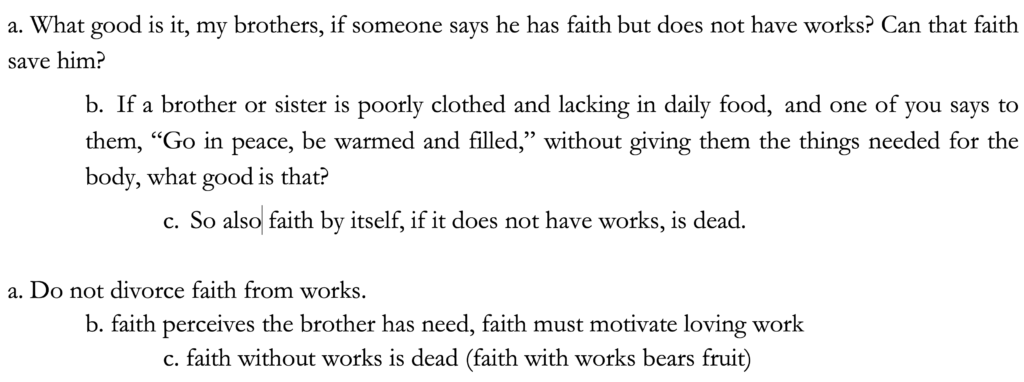The evangelical milieu of America has often lost a vision of the fruit of repentance. We tend to simplify repentance by asking for forgiveness. After all, Jesus tells Peter to forgive 70 times 7. This verse must be paired with Paul’s scoffing at the question: why not sin more so grace may abound, lest the forgiven be allowed to flit about in the wind of their fleshly desires? Yes, the forgiver must be eager and ready to forgive as Christ has forgiven us. The forgiven party, however, is required to bear fruits in keeping with repentance. Granted, many Christians would agree that someone who confesses of lying, for example, must speak the truth to demonstrate their repentance. This fruit is certainly an advantage to the soul of the offender. It is good for the lying tongue to practice honesty. I would argue that the final end of the fruits of repentance is not merely to have done the right thing but rather to participate in the redemption of others. We are freed from sin in forgiveness so that we may choose to do the good and bring freedom to our neighbors.
Let us observe such a progression in Ephesians 4:28:

This is a simple enough structure to identify, but as I chewed on this, it seemed to demonstrate the entire motif of Christian obedience: death to the old man, raising to new life, all for the sake of participating in glorified redemption. Obedience in this sense is not merely to work with your hands; it is to be generous so that we may relieve others from poverty. Not only is the recipient of generosity relieved from poverty; more importantly, they are relieved from a temptation to sin as a thief themselves. Consider what provokes a thief to steal. Often, a thief is tempted to steal because he lacks the resources for provision. A former thief who works and becomes fruitful enough to be generous can supply for the needs of the destitute those whom otherwise may be tempted to steal in light of their needs. His matured fruit of repentance provides resources for an impoverished soul so they may not fall into thieving also. The cleanness of the new humanity in Christ has become contagious and capable of renovating the world.
With the condensed sample in mind, we can find a similar pattern in the chief passage regarding Christian obedience in James 2:14–17:

The case law in Exodus provides an abundance of examples of a similar movement of command to confession to fruitful restoration. Take the ninth Word of the Decalouge as an example (“Thou shalt not steal”) and then the laws of restoration for certain theft in Exodus 22:1:

We can abstract the rhythm to the general pattern of Christian repentance and obedience.

When we conform ourselves to the will of the Father through union with His Son, we bear fruit of the Spirit. This fruit is never for our own benefit primarily; rather, the fruit of the Spirit in obedience is aimed at fostering a redemptive environment for our brothers and neighbors. Whether as in James it is to give a coat or food to deliver a brother from hunger and cold, or in Ephesians when the thief is generous thus reducing the temptation of theft from others, the fruit of our obedience provides micro-redemptions to those around us. The kingdom comes on earth as it is in heaven when we are in harmony with the law of God by the Spirit. These marks of fruitful obedience coalesce with our Trinitarian theology and lend a fuller understanding to our identity as image bearers of God.

This Trinitarian movement grows us in the three theological virtues of faith, hope, and love which are virtues that we cannot attain but rather must be given to us from God himself. Our faith in the Father Almighty is manifested in our love from and toward the Son which grants us the hope of the heavenly fruit found in faithful service. Faith, hope, and love are not exclusively annexed to those three persons of the Trinity lest we be tri-theists. They are gifts that flow to us through union with God. The loving hope of the Father generates faith. The faithful hope from the Son fosters love. The loving faith of the Spirit animates our hope in the promises we have heard but not yet seen. When we make this multi-stable chiasm of faithful obedience our matrix for faith and works, we begin what fruitful repentance looks like. We begin to see the basic DNA of the Christian life in its essential divine origins.
Our pursuit of godliness flows from our personal union with our creator and redeemer. Godly generosity is generosity born of God. Godly diligence is diligence born of God. This trinitarian obedience is governed by the law, enabled in imitative participation, and glorified in abundant fruit. We will cease to see calls to obedience as “legalistic” and rather see them as fulfillments of Christian maturity. Our obedience will not cease at “doing good labor” but will glorify itself into “and be generous to those in need.” The Church will take on the aroma of the early Christians that didn’t just resist retaliating against their persecutors but also gave their own lives to care for their persecutors in times of plague.
This type of obedience to our Lord will demonstrate the supernatural origin of our virtue. We will pursue generosity and glorious fruit apart from self-consciousness because we know our Lord is animating our obedience. We will become a church that loves its Lord with its mind, body, and soul. We will demonstrate the organic ligaments that bind the body of Christ in faith working through love unto an everlasting hope.
Matt Corey, along with his wife and their three children live in Maine. He is a pastor, a teacher at Mirus Academy, a writer, and musician.
